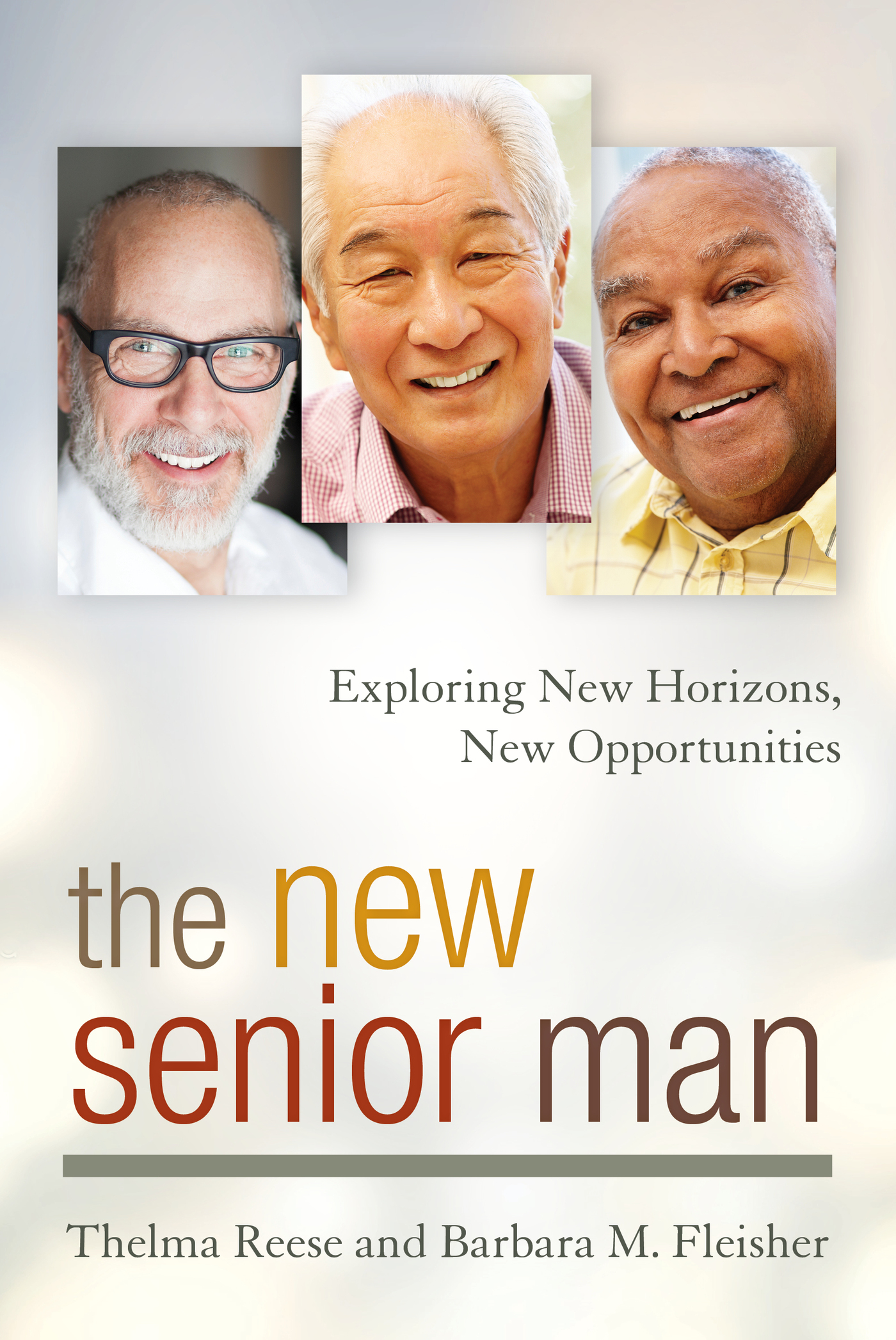The New Senior Man
The New Senior Man
Exploring New Horizons,
New Opportunities
Thelma Reese and Barbara M. Fleisher
ROWMAN & LITTLEFIELD
Lanham Boulder New York London
Published by Rowman & Littlefield
A wholly owned subsidiary of The Rowman & Littlefield Publishing Group, Inc.
4501 Forbes Boulevard, Suite 200, Lanham, Maryland 20706
www.rowman.com
Unit A, Whitacre Mews, 26-34 Stannary Street, London SE11 4AB
Copyright 2017 by Thelma Reese and Barbara M. Fleisher
All rights reserved. No part of this book may be reproduced in any form or by any electronic or mechanical means, including information storage and retrieval systems, without written permission from the publisher, except by a reviewer who may quote passages in a review.
British Library Cataloguing in Publication Information Available
Library of Congress Cataloging-in-Publication Data
Names: Reese, Thelma, 1933 author. | Fleisher, Barbara M., 19302016 author.
Title: The new senior man : exploring new horizons, new opportunities / Thelma Reese and Barbara M. Fleisher.
Description: Lanham : Rowman & Littlefield, [2017] | Includes bibliographical references.
Identifiers: LCCN 2017008262 (print) | LCCN 2017025091 (ebook) | ISBN 9781442271975 (electronic) | ISBN 9781442271968 (cloth : alk. paper)
Subjects: LCSH: Retirees. | Older menRetirement. | RetirementPsychological aspects.
Classification: LCC HQ1062 (ebook) | LCC HQ1062 .F5643 2017 (print) | DDC 305.26/1dc23
LC record available at https://lccn.loc.gov/2017008262
 TM The paper used in this publication meets the minimum requirements of American National Standard for Information Sciences Permanence of Paper for Printed Library Materials, ANSI/NISO Z39.48-1992.
TM The paper used in this publication meets the minimum requirements of American National Standard for Information Sciences Permanence of Paper for Printed Library Materials, ANSI/NISO Z39.48-1992.
Printed in the United States of America
Dedicated to men who shaped our lives by nurturing, supporting, protecting, and inspiring:
Isadore Fine, Benjamin Terdiman, Morton Fine, Marvin Terdiman, Daniel Fleisher, and Harvey Reese
Introduction
What are those ElderChicks doing writing a book about men? We realize that this question may be occurring to you as you open this book. We can explain.
A few years ago, we wrote a book called The New Senior Woman: Reinventing the YearsBeyond Mid-Life. Some of the women in your life may have read it or heard us talk about it. We wrote it when we realized that among our contemporaries we might find the role models we needed who could help us navigate a new world that our mothers and grandmothers never knew. Not only had our context, the world we live in, changed dramatically, but our lives were also being extended, quite literally. A woman retiring from work in her early sixties might look forward to another active third of her life. What could women who were living these years well tell the rest of us? Well, it turned out they had a lot to tell usand they did. And what they told us and all the women who read our book turned out to be valuable in providing examples and inspiration for the longevity that was suddenly upon us.
Invariably, wherever we have talked about our book and the issues raised by the women we meet, someone in the audience asks, What about men? Wheres the book about men? The questioner may be a man or woman, but someone always asks. After all, men are living longer, too. They have had to adjust to rapidly advancing technology and the challenges that come with longer life. When we wrote about women, we considered, of course, the enormous effects on womens lives of their changing roles in society. We called it womens lib in the early days. Those changes have affected the lives of the men they live with and work with just as much as they have affected womens own lives.
Both genders fortunate enough to reach what may turn out to be more than a whole third of active life will encounter ageism, which appears to bypass only people running for president of the United States or repeating long terms in Congress. Even unconsciously we have absorbed attitudes that may come as a shock when the stereotypes begin to include us. Men may encounter the effects of ageism earlier than ever, especially in the workplace. How else to explain the fact that since the American Society for Aesthetic Plastic Surgery began collecting statistical data in 1997, there has been a nearly 300 percent increase in the number of procedures performed on men? The last five years have seen a 43 percent increase for men overall, including neck lifts, eye lifts, jawline recontouring, and liposuction.
Suppositions, generalizations, and common wisdom about men are reflected in the titles we found when we began to explore the possibility of this book. Men, we had been told, were not likely to want to talk about themselves, except perhaps to provide biographical facts or work histories. They were more likely to tell what they did than why. Unlike women, who usually have a network of intimates with whom they share the facts and emotions of their lives, mens conversations with each other were more likely to be about sports, work, politics, money, or physical activity. Most of the books written for men bear this idea out. The great majority of such books for men advise them on financial planning, real estate investment, and learning about the stock market, even mixing a better martini. Some suggest hobbies or ways to improve athletic skills. We found none that illuminate how men from varied walks of life and backgrounds are navigating life in a postpatriarchal world, one where the role of authority figure isnt so clearly defined and the prospect of an age of retirement is likely to be much longer than expected.
Perhaps even more than the women we met, men, too, can appreciate the need to redefine and reinvent their lives beyond the world of work. A mans context, the world he lives in, has changed, and so must he. It bears little resemblance to the world that his father and grandfather knew when they were sent off to retirement with the proverbial gold watch and the gift of a new set of golf clubs. The new senior man will find that the best is yet to come. Discovering what that best will be for him is the new adventure. The place to start, we found, was with the men from all walks of life who shared their time, their stories, and their discoveries so generously and openheartedly with us. They have found this unexpected gift of time exciting and fulfilling in ways that were unexpected.
Their stories, in their own words, will inspire your own.
Notes
Barbara Fleisher and Thelma Reeses blog is http://elderchicks.com.
Barbara M. Fleisher and Thelma Reese, The New Senior Woman: Reinventing the YearsBeyond Mid-Life (Lanham, MD: Rowman & Littlefield, 2013).
Jennifer Harper, Dramatic Increase: Plastic Surgery for Men Up by 43 Percent as They Compete in the Job Market, Washington Times, March 12, 2015, http://www.washingtontimes.com/news/2015/mar/12/plastic-surgery-43-percent-among-men-report/.
Chapter 1
Manning Up to Retirement
Retired is being twice tired, Ive thought: First tired of working, then tired of not.
Richard Armour
Why Manning Up?
Remember when you first heard man up? Was it directed to you or, perhaps, another boy on your team when he couldnt hit the ball or when bullying reduced him to tears? You or your friend carried that voice internally. It said, Dont cry to the little boy; Dont let them see how you feel to the adolescent; Pull yourself together and dont be a wimp to the adult. It still speaks, signaling Time to face the music of aging and make the most of it to the man facing a next stage in life.
Next page
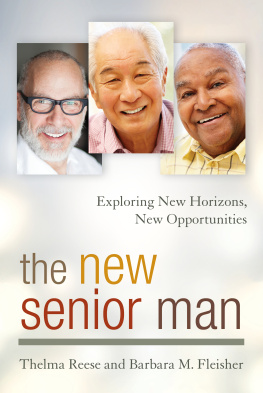

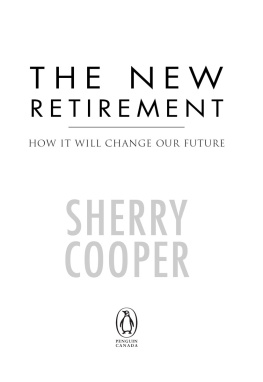
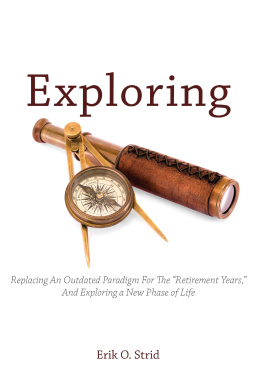
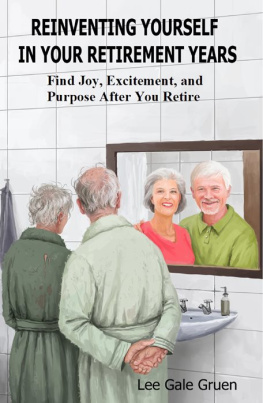
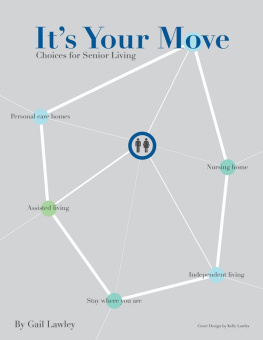
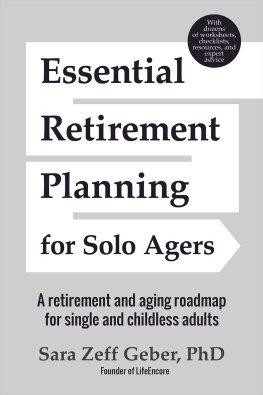
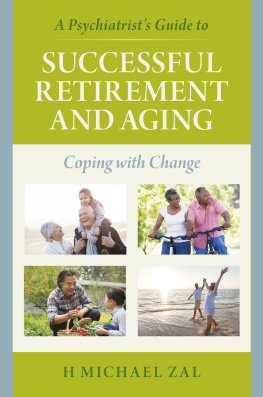
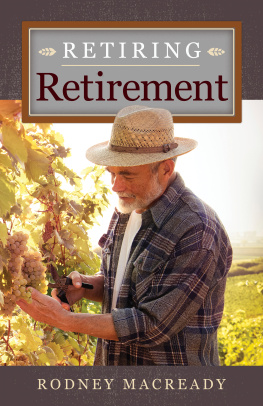
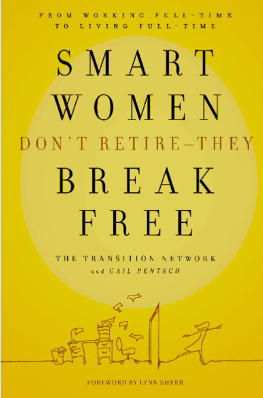
 TM The paper used in this publication meets the minimum requirements of American National Standard for Information Sciences Permanence of Paper for Printed Library Materials, ANSI/NISO Z39.48-1992.
TM The paper used in this publication meets the minimum requirements of American National Standard for Information Sciences Permanence of Paper for Printed Library Materials, ANSI/NISO Z39.48-1992.